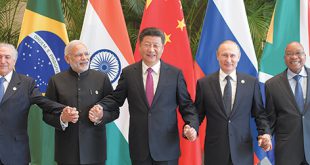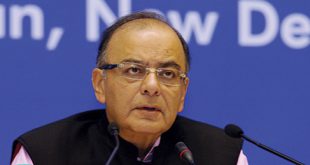New Delhi / AFP Prime Minister Narendra Modi will look to reinvigorate the BRICS group of emerging nations at a summit this weekend with India seen as a bright spot in a bloc whose clout has been undermined by economic woes. BRICS — a club made up of Brazil, Russia, India, China and South Africa — was formed in ...
Read More »India’s FM warns against rising protectionism
Mumbai/ AFP Indian Finance Minister Arun Jaitley warned on Thursday that growing opposition to globalisation and free trade in Western countries would hurt the world economy, echoing concerns by the IMF and others. Jaitley told a gathering of officials from the BRICS group of emerging nations ahead of a summit this weekend that he was concerned about protectionist movements ...
Read More »China exports dive on weak global demand
Beijing / AFP China’s exports plummeted in September, data showed on Thursday, as anaemic global demand dealt another blow to the world’s second-largest economy, while weak imports fuelled worries about crucial domestic appetite. The figures will come as a disappointment after a recent batch of healthy statistics, and suggest the Asian giant and key driver of the global economy ...
Read More »TCS posts US$894mn quarterly profit
Mumbai / AFP India’s Tata Consultancy Services reported an 8.8 percent year-on-year rise in quarterly profits on Thursday as strong growth in Europe helped the IT giant override a slump in its domestic market. The firm, based in India’s financial capital Mumbai, said net profit for the three months to September 30 rose to 65.86 billion rupees ($984 million) ...
Read More »Samsung Note 7 recall in US expands
SEOUL/ AP Samsung Electronics said on Thursday it has expanded its recall of Galaxy Note 7 smartphones in the US to include all replacement devices the company offered as a presumed safe alternative after the original Note 7s were found prone to catch fire. The move announced on the websites of Samsung and the Consumer Product Safety Commission on ...
Read More »TSMC sees profit boost from iPhone 7
Taipei / AP Apple’s new iPhone 7 series gave Taiwan microchip giant Taiwan Semiconductor Manufacturing Co (TSMC) a boost Thursday as the firm announced profits were up by almost a third compared with last year. The company was also set to benefit from the demise of Samsung’s Galaxy Note 7, analysts said, after the South Korean smartphone giant had ...
Read More »Thailand’s beloved king, unifying figure, dies at 88
Bangkok / AFP Thailand’s King Bhumibol Adulyadej, the world’s longest-serving monarch, has died at the age of 88, the palace announced on Thursday, leaving a divided nation bereft of a rare figure of unity. “Although the team of doctors treated him to the best of their ability, his condition deteriorated,” the Royal Household Bureau said in a statement. “At 15:52 ...
Read More »Washington Post backs Clinton for president
Washington / AFP The Washington Post on Thursday became the latest US newspaper to emphatically endorse Hillary Clinton for the White House, saying it was swayed as much by her competence as by the alarming specter of a Donald Trump presidency. “Hillary Clinton has the potential to be an excellent president of the United States, and we endorse her ...
Read More »Brexit battle reaches UK high court
London / AFP The battle over Brexit reached the High Court on Thursday in a legal challenge to Prime Minister Theresa May’s right to start negotiations for Britain to leave the EU without a vote in parliament. The move could delay Brexit if successful and set up an unprecedented constitutional face-off between the courts and the government. It was ...
Read More »Dutch mull assisted suicide for those who feel life is over
The Hague / AFP The Dutch government is mulling a new law to give elderly people who are not sick the legal right to assisted suicide if they feel their lives are “complete”. “People who believe after deep reflection that they have completed their lives, should be able under strict conditions to end their lives in the dignified manner ...
Read More » The Gulf Time Newspaper One of the finest business newspapers in the UAE brought to you by our professional writers and editors.
The Gulf Time Newspaper One of the finest business newspapers in the UAE brought to you by our professional writers and editors.







